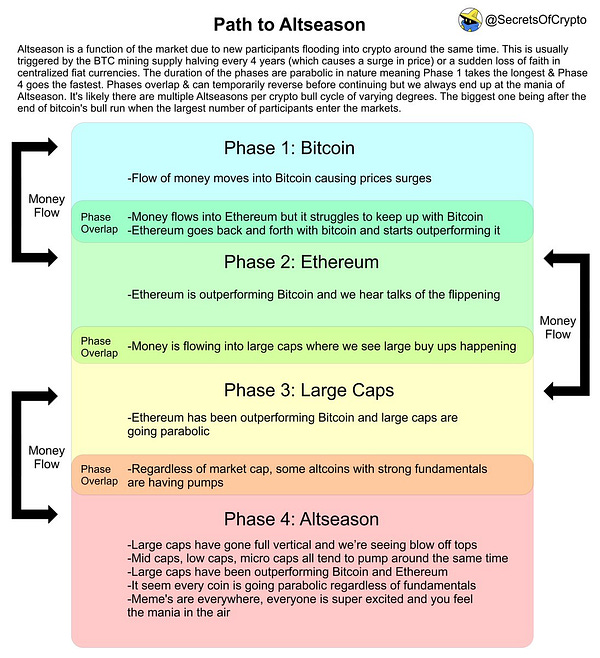Riding The Wave News Summary #29
Axie Infinity’s Ronin Network Suffers $625M Exploit, ‘Institutional demand’ — Large transactions on Cardano up 50x in 2022, Voyager ordered by New Jersey to 'cease and desist’, ...
Welcome to Riding The Wave. If you have questions or feedback, please reply to this email. If you are new to the Newsletter, please check out what we provide on our about page and consider subscribing. Within the Newsletter, I provide News Summaries, Weekly Status Updates, & Deep Dive Articles on Specific Topics (Ex: How do I pick which coins/tokens to buy?). More details here
News
Table of Contents
Tweets
‘Institutional demand’ — Large transactions on Cardano up 50x in 2022
Ripple Co-Founder Chris Larsen Blasted as 'Judas' After Proposal to Change Bitcoin
Tweets


Axie Infinity’s Ronin Network Suffers $625M Exploit
The gaming-focused Ronin Network announced Tuesday a loss of over $625 million in USDC and ether (ETH).
According to a blog post published by the Ronin Network’s official Substack, the exploit affected Ronin Network validator nodes for Sky Mavis, the publishers of the popular Axie Infinity game, and the Axie DAO.
An attacker “used hacked private keys in order to forge fake withdrawals” from the Ronin bridge across two transactions, as seen on Etherscan.
While the Ronin sidechain has nine validators requiring five signatures for withdrawals and is meant to protect against these types of attacks, the blog post notes that “the attacker found a backdoor through our gas-free RPC node, which they abused to get the signature for the Axie DAO validator.”
Back in August 2021, a hacker made off with $611 million in an exploit of cross-chain decentralized finance (DeFi) protocol Poly Network. The vast majority of the funds were returned.
The Ronin Bridge and the Katana automated market maker (AMM) have both been paused while investigations are ongoing.
“We are working directly with various government agencies to ensure the criminals get brought to justice,” the blog notes.
The price of RON, the native token of the Ronin network, is down 27% on the news, according to CoinGecko.
It’s interesting to see people steal cryptocurrencies as everything is traceable via the blockchain. This presents a unique problem for thieves in that even if they manage to steal the money it’s all tracked on-chain, which when removed via exchanges gives away who stole it (Thanks to Know Your Customer/KYC & other policies). Of course, there are tricks to make the funds harder to track such as using NFTs to exchange it or using other coins that help to hide where the money goes but at the end of the day there isn’t any perfect route currently available. This leads to funds often being recovered when stolen in large amounts, similar to the situation with the Poly Network.
As long as the network locks out the funds from trade (being taken off via exchanges) this theft will likely have minimal long-term impact instead providing some investors a lower buy-in point to invest currently.
‘Institutional demand’ — Large transactions on Cardano up 50x in 2022
Crypto intelligence firm IntoTheBlock reports that the number of large transactions on the Cardano blockchain has increased by more than 50x this year.
Large Transaction Volume (LTV) refers to aggregated volume from transactions denominated in Cardano’s ADA token valued at more than $100,000. Since Jan. 1, the LTV has increased from 1.35 billion ADA per day to 69 billion ADA (worth $81.4 billion) changing hands on Cardano on Monday.
That’s a 51-fold increase in about three months and marks one of the highest volume levels since mid-2018, according to IntoTheBlock. In a Tuesday tweet, the firm said that such high volumes indicate “increasing institutional demand.”
While other metrics such as average transaction size and volatility remain relatively stagnant, total addresses have been increasing since the start of 2022, according to the data analytics firm. The year began with about 3.4 million addresses, which has now grown to 5 million.
Hoskinson gave a rousing keynote speech at Binance Blockchain Week in Dubai on Monday in which he spoke of the need for decentralization and the difficulties in coordination it entails. He said that “we are entering a new era” with Web3, but the problem is that “unlike with Web2, there’s no leader” to make decisions for the industry.
“There are two paths before us — one, we keep our integrity and we look to decentralization, find these things, understand these things,” he said. “Or, two, we ignore it. In which case we’ll have custodians, we’ll have escort keys, highly centralized, highly optimized consensus algorithms that can be reset at any time. The few will be in control of the many.”
The wallet creation rate and large transaction rate increasing are good to see as it means more people are jumping into ADA. Hoskinson also raised a good point on whether crypto will compromise for convenience and restorability or if it will remain as distributed as possible.
In my opinion, I think this problem will be resolved by the banking system and other companies. If they continue adopting crypto eventually they will provide a layer on top allowing crypto to keep most of its core values while customers still get access to features that may go against its principles.
Voyager ordered by New Jersey to 'cease and desist’
The New Jersey Bureau of Securities has issued a cease and desist order against Voyager Digital for selling unregistered securities through its Voyager Earn program.
Voyager Digital (VGX) is a centralized, crypto-based staking, trading, and lending platform.
The order claims that each of the crypto staking and lending accounts issued through the program since 2019 are unregistered securities because of their promise of interest rates as high as 12%.
At least five other states, Alabama, Oklahoma, Texas, Kentucky, and Vermont, have slapped Voyager with various orders, or demanded the company explain how it is not issuing unregistered securities if it wishes to stay in business in their respective states.
This incident is one in a growing list of such cases or orders against crypto companies that offer interest-bearing accounts to users. In February, crypto lending platform BlockFi was hit with a similar cease and desist order from Washington state and a $100 million penalty for selling unregistered securities in the form of its interest-bearing accounts.
Situations like these will keep happening until we get clear regulations. Companies that aren’t dependent on crypto as a service/product are afraid to jump in at all (since they don’t need to take the risk anyway) whereas companies that do provide it as a core service go full-on with risk as they are already at risk for fines so they might as well push as far as they can and stay competitive with other companies.
Keep reading with a 7-day free trial
Subscribe to Riding The Wave to keep reading this post and get 7 days of free access to the full post archives.










